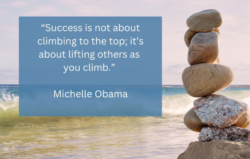Motherly Love: From Mothers and Others

What does it take to be a mom? Are all women cut out for it? Are women without children deprived of the blessing of giving that most tender unqualified love?
Mothering is for everyone
Intuition, patience, wisdom, love—all the divine qualities associated with motherhood—often depend on how rested we are mentally and physically as well as how aligned we are with our emotional virtues and the most profound authentic level of our self. The ability to love and nurture have less to do with our circumstances than with the health of our mind and body.
At that moment when the phone is ringing, the pot is boiling over, you’re late for work, and the baby drops her cheerios on the kitchen floor, you may not be feeling a great deal of motherly love. You might, instead, feel a tension headache coming on.
This is when—in a television commercial—the mom runs for the medicine cabinet and gobbles down a couple of pills. In the next frame we see her recovered from the stress—answering the phone with one hand, turning down the gas on the stove with another, cleaning up the cheerios and picking up her baby with two magic invisible hands—there is nothing that Super Mom, with the medication taking effect, can’t do.
Motherhood came along a lot earlier than stress medication, nannies, and pre-school. While all of these are appropriate and helpful in their way, none of them are substitutes for motherly love. It doesn’t come in a bottle, it isn’t even automatically delivered with your new bundle of joy, and it might be the one thing that you can’t learn from a book on parenting.
The truth is that women are hard-wired to mother. Even if we don’t have children, the capacity to connect deeply, to nurture, to express compassion, to be generous, and to uplift, is inherent within us.
A friend of mine who has three children and four grandchildren, all blessed with her care, says that mothering means being firm but also flexible. It means re-adjusting your expectations as your child grows up. It means having enough silence in your own mind to be able to truly listen and to be present. You have to be appreciative of the child, even respectful. It is qualities like these in a mother that invest children with self-esteem and a feeling of safety in expressing themselves—then and in school and later, as adults. If you are nourishing and present, the child will have a relaxed heart and is capable, in turn, of being kind.
A study published online April 25th in the Proceedings of the National Academy of Sciences Early Edition showed that motherly love can help children’s brains grow at twice the rate as those of neglected children. It is known that a nurturing, stable home life improves overall childhood development, but this is the first research to prove that nurturing has a significant impact on brain size. Preschool children who received the most love and support from their mothers were found to have greater growth in the hippocampus, which is associated with learning, memories, and regulating emotions.
Our ability to nurture is within ourselves
Every woman has an infinite capacity to love and uplift. It seems to disappear when we are stressed, anxious, tired, angry, depressed or unbalanced in any number of ways. So how do we reduce the stress, get the rest we need, minimize the anger and depression—and still get everything done that needs to be done?
The Transcendental Meditation technique provides us with twice-daily experience of inner silence that replenishes our depleted reserves and enlivens our inner connectedness to our deepest sense of Self, which in turn supports our ability to sincerely and authentically connect with, and positively influence, the world around us. The simultaneous deep physical rest experienced during TM diminishes stress and fatigue—and the impatience and intolerance that accompany those issues—rewarding us with a naturally relaxed, stress-resilient physiology, and a heart that can spontaneously flow in love and support.
Life seems to present us with constant opportunities to care for and support others. At work, our associate is criticized for a poor presentation—opportunity! At the supermarket, the cashier is rushed by a long line of impatient shoppers—opportunity! Our friend calls to cry on our shoulder when her boyfriend uses cutting words in an argument—opportunity! There was a 1970 hit song by Stephen Stills called, “Love the One You’re With.” There is always an opportunity to flow with “motherly” love to whomever you’re with, because everyone, at any age, can benefit from nurturing. And when you have the ability enlivened within you to flow with motherly love, it is an effortless—and deeply rewarding—experience. It is one of those precious relationships with the world in which you find that you are uplifted in the act of uplifting.
And when you’re on your own? Just offer up some of that motherly love to yourself. Treat yourself gently, get plenty of rest, meditate, eat delicious nourishing food, enjoy the beauty of nature, get a massage—whatever strengthens life, brings your spirits up, and gives you peace and happiness.
Whether we have children or not, board-certified obstetrician Rebecca Douglas offers advice that is relevant to all of us, “We can only give from what we have. And if what we have is exhaustion, then we’ll have less of a basis from which to give. If, on the other hand, we have a methodology to rest and rejuvenate and give rest to ourselves, then we’ll have that much more to give.”
About the Author
Janet Hoffman is the executive director of TM for Women Professionals, a division of TM for Women in the USA





